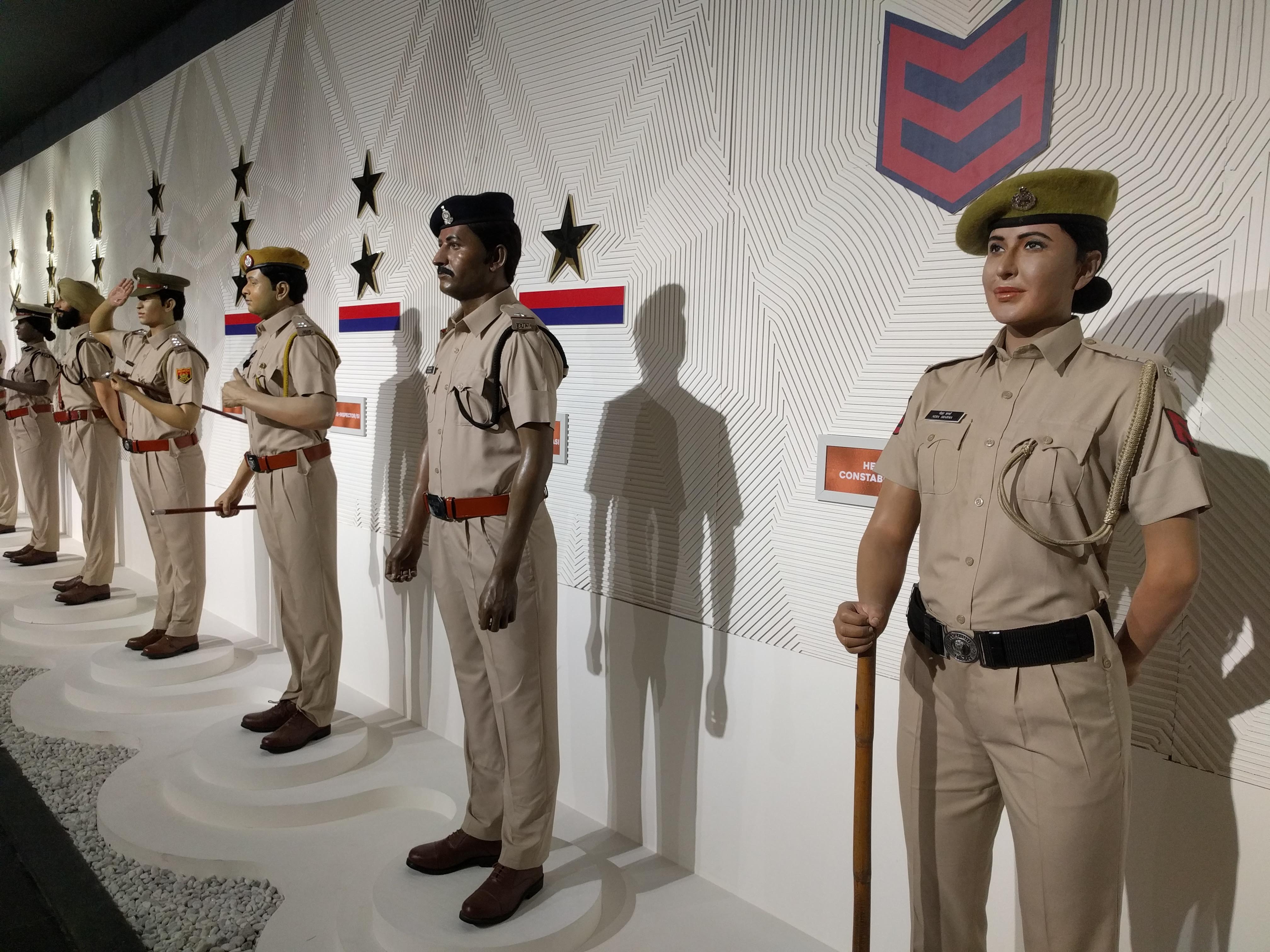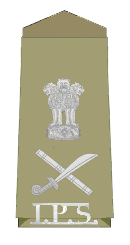|
Uttar Pradesh Police
The Uttar Pradesh Police (UP Police), (IAST: ), is the primary law enforcement agency within the Uttar Pradesh state of India. Established in 1863 as the Office of the Inspector General of Police, United Provinces under the ''Police Act, 1861''. It is headed by Director General of Police (DGP). Uttar Pradesh Police is one of the oldest police departments in the Republic of India, and is the largest police force in the world, having about 68 district police department (excluding 7 commissionerates) in it. The Uttar Pradesh Police is headquartered at Signature Building, Gomti Nagar Extension in Lucknow which was earlier located in city of Prayagraj The Uttar Pradesh Police employ around 1,368 gazetted officers, and 231,443 non gazetted uniformed officers. Uttar Pradesh Police is governed by the Department of Home and Confidential of Uttar Pradesh. The Uttar Pradesh Police is headed by the Director General of Police (DGP) for the state of Uttar Pradesh, who is the highest-ra ... [...More Info...] [...Related Items...] OR: [Wikipedia] [Google] [Baidu] |
Hindi
Hindi (Devanāgarī: or , ), or more precisely Modern Standard Hindi (Devanagari: ), is an Indo-Aryan language spoken chiefly in the Hindi Belt region encompassing parts of northern, central, eastern, and western India. Hindi has been described as a standardised and Sanskritised register of the Hindustani language, which itself is based primarily on the Khariboli dialect of Delhi and neighbouring areas of North India. Hindi, written in the Devanagari script, is one of the two official languages of the Government of India, along with English. It is an official language in nine states and three union territories and an additional official language in three other states. Hindi is also one of the 22 scheduled languages of the Republic of India. Hindi is the '' lingua franca'' of the Hindi Belt. It is also spoken, to a lesser extent, in other parts of India (usually in a simplified or pidginised variety such as Bazaar Hindustani or Haflong Hindi). Outside India, several ot ... [...More Info...] [...Related Items...] OR: [Wikipedia] [Google] [Baidu] |
Inspector General Of Police
An Inspector General of Police is a senior police officer in the police force or police service of several nations. The rank usually refers to the head of a large regional command within a police service, and in many countries refers to the most senior officer of the entire national police. Bangladesh In Bangladesh, the Bangladesh Inspector General of Police heads the Bangladesh Police. Ghana In Ghana, Inspector General of Police is the title of the head of the Ghana Police Service. India During the British India era, the British Government introduced the Indian Councils Act 1861. The act created a new cadre of police, called Superior Police Services, later known as the Indian Imperial Police. The highest rank in the service was the Inspector General. Currently, in modern India, an Inspector General of Police (IGP) is only an officer from Indian Police Service. In a state, an IGP holds the third-highest rank in the hierarchy, just below the rank of Additional Director Gen ... [...More Info...] [...Related Items...] OR: [Wikipedia] [Google] [Baidu] |
Jawaharlal Nehru
Pandit Jawaharlal Nehru (; ; ; 14 November 1889 – 27 May 1964) was an Indian anti-colonial nationalist, secular humanist, social democrat— * * * * and author who was a central figure in India during the middle of the 20th century. Nehru was a principal leader of the Indian nationalist movement in the 1930s and 1940s. Upon India's independence in 1947, he served as the country's prime minister for 16 years. Nehru promoted parliamentary democracy, secularism, and science and technology during the 1950s, powerfully influencing India's arc as a modern nation. In international affairs, he steered India clear of the two blocs of the Cold War. A well-regarded author, his books written in prison, such as ''Letters from a Father to His Daughter'' (1929), '' An Autobiography'' (1936) and ''The Discovery of India'' (1946), have been read around the world. During his lifetime, the honorific Pandit was commonly applied before his name in India and even today too. T ... [...More Info...] [...Related Items...] OR: [Wikipedia] [Google] [Baidu] |
Prime Minister Of India
The prime minister of India (IAST: ) is the head of government of the Republic of India. Executive authority is vested in the prime minister and their chosen Council of Ministers, despite the president of India being the nominal head of the executive. The prime minister is often the leader of the party or the coalition with a majority in the lower house of the Parliament of India, the Lok Sabha, which is the main legislative body in the Republic of India. The prime minister and their cabinet are at all times responsible to the Lok Sabha. The prime minister is appointed by the president of India; however the prime minister has to enjoy the confidence of the majority of Lok Sabha members, who are directly elected every five years, lest the prime minister shall resign. The prime minister can be a member of the Lok Sabha or of the Rajya Sabha, the upper house of the parliament. The prime minister controls the selection and dismissal of members of the Union Council of Ministers ... [...More Info...] [...Related Items...] OR: [Wikipedia] [Google] [Baidu] |
President's Colour Award
The President's Colour Award is the highest honour that can be bestowed upon any military unit of India. It is also known as ''′Nishaan′'' which is an emblem that is worn by all unit officers on the left-hand sleeve of their uniform. The presentation of the award or standards by the Supreme Commander of the Armed Forces of India (President of India) is an acknowledgement of the unit's meritorious service. While the practice of carrying the Colour into battle has stopped, the tradition of receiving, holding and parading the Colour continues even today in the Armed forces. To this day, the President's Colours is very significant, if the unit lose their colours, it is a disgrace for that unit and, if the unit captured the enemy's colours then it is a great honour for that unit. The 'Standards' are awarded to Heavy Cavalry and the 'Guidons' are awarded to Light Cavalry. History In military organizations, the practice of carrying colours, standards or guidons, both to act as a ... [...More Info...] [...Related Items...] OR: [Wikipedia] [Google] [Baidu] |
Inspector-general Of Police
An Inspector General of Police is a senior police officer in the police force or police service of several nations. The rank usually refers to the head of a large regional command within a police service, and in many countries refers to the most senior officer of the entire national police. Bangladesh In Bangladesh, the Bangladesh Inspector General of Police heads the Bangladesh Police. Ghana In Ghana, Inspector General of Police is the title of the head of the Ghana Police Service. India During the British India era, the British Government introduced the Indian Councils Act 1861. The act created a new cadre of police, called Superior Police Services, later known as the Indian Imperial Police. The highest rank in the service was the Inspector General. Currently, in modern India, an Inspector General of Police (IGP) is only an officer from Indian Police Service. In a state, an IGP holds the third-highest rank in the hierarchy, just below the rank of Additional Director Gen ... [...More Info...] [...Related Items...] OR: [Wikipedia] [Google] [Baidu] |
Police Act
Police Act is a stock short title used for legislation in India, Malaysia and the United Kingdom relating to police forces and officers. List India *Indian Police Act 1861 Malaysia *The Police Act 1967 United Kingdom *The Police (Property) Act 1897 *The Police Act 1909 *The Police Act 1919 *The Police (Overseas Service) Act 1945 *The Police Act 1946 *The Police Act 1964 *The Police Act 1969 *The Police Act 1972 *The Police Act 1976 *The Police and Criminal Evidence Act 1984 *The Police and Magistrates' Courts Act 1994 *The Police Act 1996 *The Police (Property) Act 1997 *The Police (Health and Safety) Act 1997 *The Police (Insurance of Voluntary Assistants) Act 1997 *The Police Act 1997 *The Police and Justice Act 2006 *The Police (Detention and Bail) Act 2011 The Police Acts 1839 to 1893 was the collective title of the following Acts: *The County Police Act 1839 (2 & 3 Vict c 93) *The County Police Act 1840 (3 & 4 Vict c 88) *The County and Borough Police Act 1856 (19 ... [...More Info...] [...Related Items...] OR: [Wikipedia] [Google] [Baidu] |
Police Ranks And Insignia Of India
Gazetted officers include all the Indian Police Service officers which are Class I officers of the cadre and all State Police Services (India), State Police Services officers of and above the rank of Deputy Superintendent of Police. All are arranged in a hierarchical order. Ranks of law enforcement in India The ranks, posts and designations of all police officers vary from state to state as law and order is a State list in India, state matter. But, generally the following pattern is observed: ;Gazetted Officers ;Non-gazetted officers Organisational structure and roles Overview Law enforcement in India is a State List, state matter. Hence, policing structure varies from state to state. But there is a general structure observed. Ministry of Home Affairs The Ministry of Home Affairs (India), Ministry of Home Affairs is in overall charge of internal as well as external security and policing and is the controlling authority for the Indian Police Service (IPS). Home Secretary, th ... [...More Info...] [...Related Items...] OR: [Wikipedia] [Google] [Baidu] |
Commissioner Of Police (India)
Commissioners of Police (also known as Police Commissioners) in India are IPS officers who head the police force in a police commissionerate. A police commissionerate can combine several adjoining districts under it. A Police Commissioner holds higher executive powers than those available to a Superintendent of Police (SP) or Senior SP (SSP) as in-charge of the police force of a district. Commissioner of Police (CP) is a post that can be held by an IPS officer of the rank SP and above, depending upon the sanction provided by the respective state government (or in case of Delhi, by the Government of India). History and description Traditionally at the district level, the Superintendent of Police (SP) or Senior SP (SSP) maintains law and order by working with the District Magistrate (DM). Under the Commissioners of Police (CP) system, the magisterial powers of DM are given to the CP and to sanctioned police officers under him/her (e.g., Special/Joint/Additional/Deputy/Assistant CP) ... [...More Info...] [...Related Items...] OR: [Wikipedia] [Google] [Baidu] |
Director General Of Police
Director general of police (DGP) is a rank in the Indian Police Service, held by the highest ranking police officer in a State or a Union Territory of India, typically heading the state or the UT police force. The DGP is appointed by the cabinet and holds a three-star rank. There may also be additional officers in the state who hold the rank of DGP. Common appointments for such officers include Director of Vigilance and Anti-Corruption Bureau, Director General of Prisons, Director General of fire forces and civil defence, Criminal Investigation Department (CID), Police Housing Society etc. Additionally officers who hold the rank of DGP may have commensurate appointments in central government organisations such as Director, Central Bureau of Investigation (CBI), Director SVPNPA, DG Central Reserve Police Force (CRPF) etc. The rank insignia of a Director General of Police or Commissioner of Police (in Delhi) is the national emblem over crossed sword and baton. DGP-ranked officer ... [...More Info...] [...Related Items...] OR: [Wikipedia] [Google] [Baidu] |






